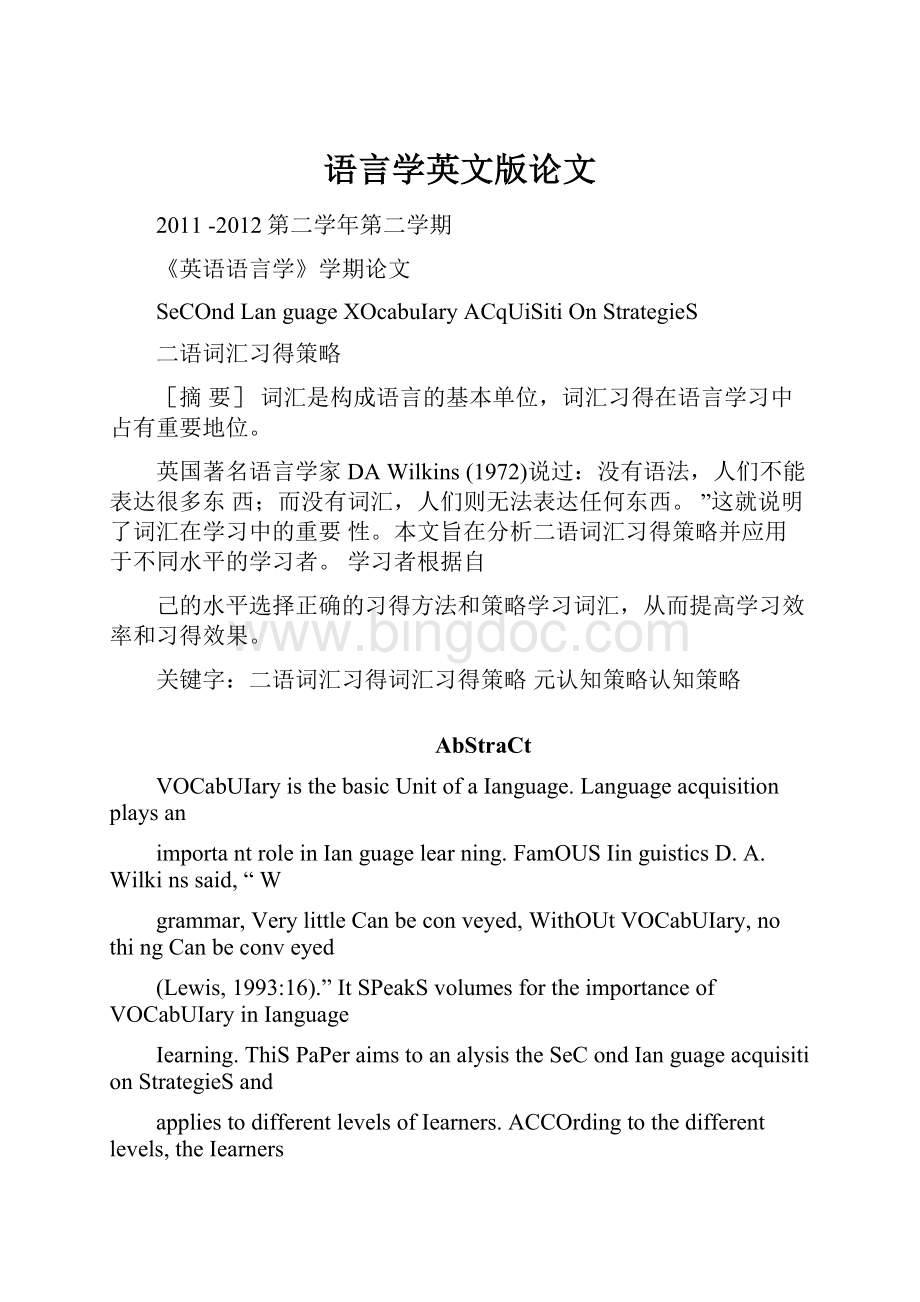语言学英文版论文Word格式.docx
《语言学英文版论文Word格式.docx》由会员分享,可在线阅读,更多相关《语言学英文版论文Word格式.docx(12页珍藏版)》请在冰点文库上搜索。

而没有词汇,人们则无法表达任何东西。
”这就说明了词汇在学习中的重要性。
本文旨在分析二语词汇习得策略并应用于不同水平的学习者。
学习者根据自
己的水平选择正确的习得方法和策略学习词汇,从而提高学习效率和习得效果。
关键字:
二语词汇习得词汇习得策略元认知策略认知策略
AbStraCt
VOCabUIaryisthebasicUnitofaIanguage.Languageacquisitionplaysan
importantroleinIanguagelearning.FamOUSIinguisticsD.A.Wilkinssaid,“W
grammar,VerylittleCanbeconveyed,WithOUtVOCabUIary,nothingCanbeconveyed
(Lewis,1993:
16).”ItSPeakSvolumesfortheimportanceofVOCabUIaryinIanguage
Iearning.ThiSPaPeraimstoanalysistheSeCondIanguageacquisitionStrategieSand
appliestodifferentlevelsofIearners.ACCOrdingtothedifferentlevels,theIearners
shouldchoosethePrOPermethodsandStrategieStopromoteIearningefficiencyandacquisitioneffect.
Keywords:
SeCOndLanguageVOCabUIaryACqUiSitionVOCabUIary
ACqUiSitionStrategies;
MetaCOgnitivestrategy;
CognitiveStrategy
IntrOdUCtiOn
Witheconomicglobalizationandmulti-polarizationoftheworld,especiallythepopulationoftheinternet,Englishbecomesmoreandmoreimportant,becauseitisconSideredasthetoolforabsorbingandcommuniCatinginformation.ASWeallknown,VOCabUIaryacquisitionisoneofthemostnoticed-questionoftheSeCondIanguagelearners.“Vocabulary”appearsintheareaoflinguists'
study.Nowadays,researchersstillcannotgiveacompleteandreasonabledefinitionofvocabulary.Since1970s,thesecondlanguagevocabularyacquisitionresearchhasgraduallybecomethehotpointandimportantsubjectinthesecondlanguagevocabularyacquisitionresearcharea.Theseresearchesaimtodiscusstheefficiencyvocabularymemorystrategiestopromotethememoryskillsandvocabularylevels.Thenhowtoacquirevocabularybecomepopularamongtheresearchers.Wenden&
Rubin(1987),'
OMalley&
Chamot(1990)refertothecontentofvocabularyacquisitionstrategies;
Rubin(1987)andOxford(1990)classifythememorystrategytothedirectcognitivestrategies.Especially,CohenAphek(1981),Porte(1988),O'
Malley19(90),Vann(90),Cohen(1990),etcmadeabasicsearchingofvocabularyacquisition.Inaword,therearevariousopinionsinhowtoacquirevocabulary.Firstly,ittalksabouttheimportanceofvocabulary.Secondly,whatdoesitmeanto“acquire”aword?
Thispapermainlyaimstothedetailanalysisofthevocabularyacquisitionfromthreeaspects:
Meta-cognitiveStrategy;
CognitiveStrategyandSocialorAffectiveStrategy.Especially,ithighlightstheeffectofthecontextandrendingtovocabularyacquisition.Thispapertalksabouttheapplicationsofthevocabularyacquisitionstrategies.Anditputsforwardsomeproblemsanddifficultiesofvocabularyacquisition.Thispaperalsodiscussesthienfluencingfactorstotheacquisition.Itincludesthemothertongue,age,languagecontact,logicalthinkingability,identitydegree,andacademicmotivation
ThepurposeofthispaperistorisetheawarenessofEnglishlearnersthattheimportanceofvocabularyinlanguagelearningandthevocabularyacquisitionstrategiescannotbeneglected,andeachstrategiesisdeeplyrootedinitslanguage.Throughtheanalysisofthetheoryofstudy,thepapertriestodrawthelearnera'
ttsentiontothestrategiesofthesecondlanguagevocabularyacquisitionandusingthevocabularyincommunication.Inordertoimprovetheacquisitionefficiency,somestrategiesputintopracticeareintroduced.
Thefirstpresentstheimportanceofvocabulary,somebasicconceptsofvocabularyandvocabularylearning,thesecondparttellswhatdoesitmeantoknowaword,thethirdpartdealswiththetheoryofvocabularyacquisitionandpresentsthefactorsanddifferencesinfluencingthevocabularyacquisition.Thefourthpartisdetaileddiscussionofvocabularyacquisitionstrategiesindifferentlevelsoflearners.Thelastpartisconclusion.
Literaturereview
1.Theimportanceofvocabulary
Asthefirsttime,whenwegotoschoolandourEnglishteacherwilltellusthatvocabularyisofgreatimportanceinlearningEnglish.Afterseveralyears,weunderstandwordsgradually,especiallywhenwestudyinhighschool.Ifweknowalittleaboutvocabulary,wemayhavepoorEnglish.Thatisbecausethelistening,speaking,readingandwritingshowthenecessaryoflearningvocabulary.
Manyresearchersagreethatlexisisatleastasimportantasstructure,becauseitisusingwrongwordsandnotwronggrammarthatusuallybreaksdowncommunication.Mistakesinlexismuchmoreoftenleadtomisunderstandingandmaybelessgenerouslytoleratedoutsideclassroomthanmistakesinsyntax.(Carter,1987).AsStephenKrashenremarked,“Whenstudentstravel,theydon'
tcarrygrammarbooks,theycarrydictionaries.
AsignificantroleofvocabularyinbothteachingandlearningprocesseswasfirststatedbyStephenKrasheninTheNaturalApproach(1985):
“Vocabularyisbasicforcommunication.Ifacquirersdonotrecognizethemeaningofthekeywordsusedbythosewhoaddressthemtheywillbeunabletoparticipateintheconversation”.
Wordsarebasictoolsinhumancommunication;
thereforetheydeterminethemainpartofpeople'
slife-relationshipsbetweenpeopleandassociationswiththesurroundingworldthatpeoplelivein.Thelargerone'
svocabulary,theeasieritistoexpressone'
sthoughtsandfeelings.
Inrealcommunication,correctlyandidiomaticallyusedvocabularycanevendecreasesomestructuralinaccuracyandgrammarerrors.(ZhangJiying,2002).Solearnersshouldenrichandexpandtheirknowledgeofwordsasmuchaspossibleinordertocommunicateeffectivelyinaforeignlanguage.
2.Whatdoesitmeanto“know”aword?
Knowingawordisnotasimplephenomenon.Infact,itisquitecomplexandgoesfarbeyondtheword'
smeaningandpronunciation.(ZhangJiying,2002).Richards(1976)thinkknowingawordmeansalsoknowingthefrequencyofwordsandtheirlikelycollocates;
beingawareofthefunctionalandsituationlimitationsthatapply;
knowledgeofthe“syntacticbehavior;
”derivationalformsandwordclass;
associativeandconnotativeknowledge;
semanticvalue-breakingdownwordsintominimalunitsaswithcomponentialanalysis(seeKatz&
Fodor1963orLeech1974);
knowingtheother(possible)meaningassociated.NagyandScott(2000)identifyseveraldimensionsthatdescribethecomplexityofwhatitmeanstoknowaword.First,wordknowledgeisincremental,whichmeansthatreadersneedtohavemanyexposurestoawordindifferentcontextsbeforethey“know”it.Second,wordknowledgeismultidimensional.Thisisbecausemanywordshavemultiplemeaningsandservedifferentfunctionsindifferentfunctionindifferentsentences,texts,andevenconversations.Third,wordknowledgeisinterrelatedinthatknowledgeofonewordconnectsknowledgeofotherwords.
Whatallofthismeansisthat“knowing”awordisamatterofdegreeratherthananall-or-nothingproposition(Beck&
Mckeown,1991;
Nagy&
Scott,2000).Thedegreeofknowingawordarereflectedintheprecisionwithwhichweuseaword,howquicklyweunderstandaword,andhowwellweunderstandandusewordsindifferentmodesanddifferentpurpose.
Knowingawordalsoimpliesknowinghowthatwordrelatestootherknowledge.Finally,knowingawordmeansbeingabletoappreciateitsconnotationsandsubtleties.Whenweknowawordatthislevel,wecanuseandrecognizeitinidioms,jokes,slang,andpuns(Johnson,&
Schlicting,2004).
3.SecondLanguageVocabularyAcquisitionStrategies
VocabularyacquisitionisthepartofEnglishlearning.Since1960s,moreandmoreattentionsandresearcheshadbeentowardtovocabularyacquisitionstrategies.Whenitcomesto1980sor1990s,thevocabularyacquisitionstrategiesgainfruitfulresults.CohenAphek(1981),Porte(1988),O'
Malley(1990),Vann(1990),Cohen
(1990)madeabasicdiscussioninvocabularyacquisitionstrategies.
O'
Malley&
Chamot(1990)classifylanguagelearningstrategyintothreemethods:
Metacognitivestrategy,Cognitivestrategy,andSocialorAffectivestrategy.Metacognitivestrategyreferstostrategiesofadvancepreparation,directedattention,selectiveattention,self-management,selfmonitoringandself-evaluation.Andtheresultsindicatethatthemetacognitivestrategyteachingissignificantindevelopinglearnerautonomy,whichshowsprominentpros-pectinforeignlanguageteaching.Acognitivestrategyservestosupportthelearnerasheorshedevelopsinternalproceduresthatenablehim/hertoperformtasksthatarecomplex(Rosenshine,1997).Theuseofcognitivestrategiescanincreasetheefficiencywithwhichthelearnerapproachesalearningtask.Theseacademictaskscaninclude,butarenotlimitedto,rememberingandapplyinginformationfromcoursecontent,constructingsentencesandparagraphs,editingwrittenwork,paraphrasing,andclassifyinginformationtobelearned.
Thememorystrategy,cognitivestrategy,socialstrategyandmetacognitvestrategyareusedmorefrequentlythantheaffectivestrategyandcompensativestrategy.
Oxford(1990)putforwardamorecomprehensiveclassificationsystemofstrategy,whichincludessixcategories:
memorystrategy,cognitivestrategy,compensatorystrategy,metacognitivestrategy,affectivestrategy,andsocialstrategy.Nation(1990)putforwardsemanticmanufacturingstrategyof“whatisit”.Fromdifferentaspect,researchershavedifferentclassificationofstrategies.Stoffer(1995)madeafactoranalysisof53vocabularyacquisitionstrategiesandextract9factors:
thestrategyofpracticeandapplywordsinauthenticsituation;
thestrategyofcreativelearningvocabulary;
theself-motivationstrategy